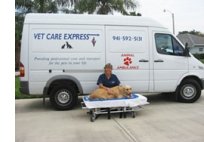|
|
 |
| Hurricane Preparedness Week: May 15-21, 2016 |
|  We all hope a tropical storm or hurricane will not threaten our area, but you need to be prepared just in case. Hurricane season starts June 1 and runs through Nov. 30. You know the importance of creating a hurricane preparedness kit for your family but many forget to include supplies for their pets. We all hope a tropical storm or hurricane will not threaten our area, but you need to be prepared just in case. Hurricane season starts June 1 and runs through Nov. 30. You know the importance of creating a hurricane preparedness kit for your family but many forget to include supplies for their pets.
We are often rushed when forecasters predict a hurricane, gathering supplies at the last minute that we may not fully prepare for our pet's needs.
Here's our must do list of preparing your pet in case of a hurricane:
Microchip pets: Microchipping pets not only helps in severe storms, it helps ensure you and your pet are reunited any time they wander off.
Update your information: Make sure your address and phone number on your pet's tag is up to date and your information is correct with the microchip company.
Create an Emergency Kit: Pack the following items to build an emergency kit for dogs or cats:
- A pet first-aid kit
- A four-day supply of your pet's food and medications
- Bottled water
- Feeding dishes
- Litter and/or disposable garbage bags
- Extra leashes and harnesses
- Photocopies of your pet's medical records
- Pictures of your pets in case you are separated
Make sure to have proper crates and carriers: Make sure the carrier offers your pet ample room to move. Label crates with your name and your pet's name.
Create a list of local pet-friendly shelters: Many areas offer emergency shelters open to animals.
To ensure the safety of your pets, Largo Veterinary Hospital has a strict policy for boarders during
hurricane season. In the event of a Mandatory Hurricane or Tropical Storm evacuation, Largo Veterinary Hospital WILL evacuate. As we have seen in previous Hurricane seasons neither humans nor animals are safe.
If you are planning to board your pets at Largo Veterinary Hospital during hurricane season you will need provide us at time of boarding with the following:
- Your out of town contact information(phone, e-mail, etc)
- Names and numbers of 2 local people that are willing to pick up your pet in the event of an evacuation.
Please be sure the local contacts are aware and willing to pick up your pets if we have to evacuate the hospital. We will give you as early a notice as possible, to give you enough time to have your pets picked up and out of harms way.
We cannot overstate the importance of this policy. We will do our absolute best to remove all pets to a safe place but we cannot guarantee shelter in a natural disaster.
|
|
|
|
| How Can You Help Prevent Dog bites?
70 million nice dogs…but any dog can bite
National Dog Bite Prevention Week® takes place during the third full week of May each year, and focuses on educating people about preventing dog bites.
|
| With an estimated population of 70 million dogs living in U.S. households, millions of people – most of them children – are bitten by dogs every year. The majority of these bites, if not all, are preventable. Understanding dog body language is a key way to help avoid being bitten. Know the signs that dogs give to indicate that they’re feeling anxious, afraid, threatened or aggressive.
Although you can’t guarantee that your dog will never bite someone, there are many ways that you can significantly reduce the risk.
- Spay or neuter your dog as soon as possible. Healthy puppies can be spayed or neutered as early as eight weeks of age. Spayed or neutered dogs may be less likely to bite.
- Socialize your dog! Well-socialized dogs make enjoyable, trustworthy companions. Undersocialized dogs are a risk to their owners and to others because they can become frightened by everyday things—which means they are more likely to aggress or bite. Socializing is the opposite of isolating. The main rule for effective socializing is to let your dog progress at her own pace and never force her to be around someone or something when she’s clearly fearful or uncomfortable.
- Take your dog to humane, reward-based training classes—the earlier the better. We recommend starting your puppy in puppy kindergarten classes as early as eight weeks, right after her first set of vaccinations.
- Make your dog a part of the family. Don’t chain or tie her outside, and don’t leave her unsupervised for long periods of time—even in a fenced yard. Most tethered dogs become frustrated and can feel relatively defenseless, so they’re much more likely to bite.
- Don’t wait for a serious accident to happen. The first time your dog shows aggressive behavior toward anybody, even if no injury occurs, seek professional help from a Certified Applied Animal Behaviorist (CAAB), a veterinary behaviorist (Dip ACVB), or a qualified Certified Professional Dog Trainer (CPDT).
- Err on the safe side. Be aware of common triggers of aggression, including pain, injury or sickness, the approach of strangers or strange dogs, the approach of people in uniforms, costumes or unusual attire, unexpected touching, unfamiliar places, crowds, and loud noises like thunder, wind, construction, fireworks and appliances.
- Always supervise children and dogs. Never leave a baby or child younger than 10 years old alone with a dog. Teach your children to treat your dog gently and with respect, giving the dog her own space and opportunities to rest.
- Don’t allow your dog to roam alone.
 Safety Tips for Children
Be aware of the fact that any dog can bite. From the smallest to the largest, even the most friendly, cute and easygoing dogs might bite if provoked. The vast majority of dog bites are from a dog known to the person—his or her own pet, a neighbor's or a friend's. You can help protect your child from dog bites by discussing with him the appropriate way to behave around dogs. We offer the following tips:
- Children should not approach, touch or play with any dog who is sleeping, eating, chewing on a toy or bone, or caring for puppies. Animals are more likely to bite if they’re startled, frightened or caring for young.
- Children should never approach a barking, growling or scared dog.
- Children should not pet unfamiliar dogs without asking permission from the dog’s guardian first. If the guardian says it is okay, the child should first let the dog sniff his closed hand. Then taking care to avoid petting the dog on the top of the head, he can pet the dog’s shoulders or chest.
- Children should not try to pet dogs who are behind a fence or in a car. Dogs often protect their home or space.
- If a child sees a dog off-leash outside, he should not approach the dog and should tell an adult immediately.
- If a loose dog comes near a child, he should not run or scream. Instead, he should avoid eye contact with the dog and stand very still, like a tree, until the animal moves away. Once the dog loses interest, the child can slowly back away.
- If a child falls down or is knocked to the ground by a dog, he should curl up in a ball with his knees tucked into his stomach, and fingers interlocked behind his neck to protect his neck and ears. If a child stays still and quiet like this, the dog will most likely just sniff him and then go away.
|
|
|
|
|
Temporary Closure: May 18th- May 22nd
We will be closed for maintenance and renovations. For safety reasons we will not be able to have any patients of staff in the hospital during this time. We are sorry for any inconvenience this may cause. If you have an emergency during this time please contact:
Tampa Bay Emergency Services
727-531-5752 or
Blue Pearl Emergency Services
727-572-0132.
|
|
 |
|
| to your account when you refer
a friend and they bring their pet in
for a first appointment at
Largo Veterinary Hospital.
|
|
|
|
|
| PET FOOD PROMO:
Purchase 10 bags,
get your 11th one FREE!
Purchase 10 cases (24 cans =1 case),
get your 11th one FREE!
This savings offer is for dry pet food such as: Hills, IVD or Purina
|
|
|
|
|
|
| Did you know Pinellas County now has a
Vet Care Express Animal Ambulance?
|
| Vet Care Express Animal Ambulance has been providing care to the veterinarians and pet owners of Sarasota and  Manatee County for over 5 years and is finally coming to Pinellas County! Vet Care Express Animal Ambulance specializes in providing both emergency and non-emergency transport for pets whether it is for a veterinary visit, transfer to a specialist, or transport to an emergency Veterinarian. Manatee County for over 5 years and is finally coming to Pinellas County! Vet Care Express Animal Ambulance specializes in providing both emergency and non-emergency transport for pets whether it is for a veterinary visit, transfer to a specialist, or transport to an emergency Veterinarian.
The Vet Care Express Animal Ambulance is equipped with oxygen, oxygen masks, stretchers, gurneys, backboards, cages and first aid medical supplies. The team is certified in Pet CPR and first aid. Vet Care Express Animal Ambulance was created with both pets, pet owners and veterinarians in mind to provide immediate, professional, compassionate care and transport for pets 24hrs a day 7 days a week. For more information vetcareexpress.com.
|
|
|
|
 Hi, my name is “Brinkley”, and I am Largo Veterinary Hospital’s May 2016 pet of the month. I am a 6 ½ year old Lhasa Apso/Poodle mix. My owners think I am special because they adopted me from the SPCA over 3 years ago and I was very well behaved and affectionate. Shhh…don’t tell Dr. Daniels that my favorite treat is peanut butter. Something funny that happened to me was the time I got a new squeaky toy and I kept biting the squeaky incessantly so someone would play with me. My owners love me so much they take me for walks several times a day. I love to sit in my daddy’s recliner chair and I do love belly rubs! I am so spoiled that I get to sleep on the couch between mom and dad while they watch TV. Hi, my name is “Brinkley”, and I am Largo Veterinary Hospital’s May 2016 pet of the month. I am a 6 ½ year old Lhasa Apso/Poodle mix. My owners think I am special because they adopted me from the SPCA over 3 years ago and I was very well behaved and affectionate. Shhh…don’t tell Dr. Daniels that my favorite treat is peanut butter. Something funny that happened to me was the time I got a new squeaky toy and I kept biting the squeaky incessantly so someone would play with me. My owners love me so much they take me for walks several times a day. I love to sit in my daddy’s recliner chair and I do love belly rubs! I am so spoiled that I get to sleep on the couch between mom and dad while they watch TV. |
|
 |
|
|
|
|
|
|
|